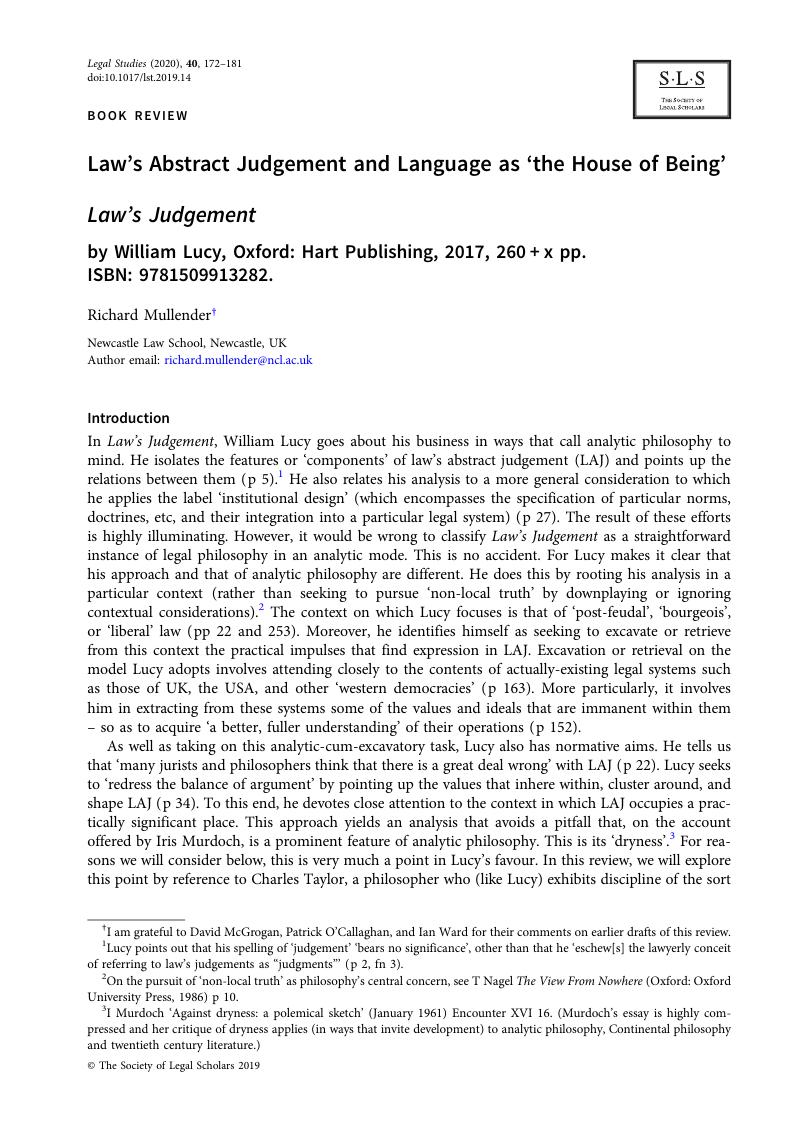No CrossRef data available.
Published online by Cambridge University Press: 23 September 2019

I am grateful to David McGrogan, Patrick O'Callaghan, and Ian Ward for their comments on earlier drafts of this review.
1 Lucy points out that his spelling of ‘judgement’ ‘bears no significance’, other than that he ‘eschew[s] the lawyerly conceit of referring to law's judgements as “judgments”’ (p 2, fn 3).
2 On the pursuit of ‘non-local truth’ as philosophy's central concern, see Nagel, TThe View From Nowhere (Oxford: Oxford University Press, 1986) p 10Google Scholar.
3 I Murdoch ‘Against dryness: a polemical sketch’ (January 1961) Encounter XVI 16. (Murdoch's essay is highly compressed and her critique of dryness applies (in ways that invite development) to analytic philosophy, Continental philosophy and twentieth century literature.)
4 Smith, NHC Taylor: Meaning, Morals and Modernity (Cambridge: Polity, 2002) pp 10–11Google Scholar. See also p 12 (where Smith notes that Iris Murdoch taught Taylor as a postgraduate in Oxford and had an ‘enduring influence’ on him).
5 Taylor, CThe Language Animal: The Full Shape of the Human Linguistic Capacity (Cambridge, Mass: Harvard University, 2016) p 15CrossRefGoogle Scholar.
6 See also Naffine, NLaw's Meaning of Life: Philosophy, Religion, Darwin and the Legal Person (Oxford: Hart Publishing, 2009) p 13Google Scholar.
7 Mansfield v Weetabix [1998] 1 WLR 1263.
8 Ibid, at 1268 per Leggatt LJ.
9 Ibid.
10 Here Lucy draws on Moran, MRethinking the Reasonable Person: an Egalitarian Reconstruction of the Objective Standard (Oxford: Oxford University Press, 2003) p 21 (p 47, fn 30)CrossRefGoogle Scholar.
11 Dunnage v Randall [2015] EWCA Civ 673.
12 Ibid, at [3] per Rafferty LJ.
13 Ibid, at [127] and [136] per Vos LJ.
14 In Dunnage, the Court of Appeal sought to distinguish Mansfield v Weetabix on grounds that academic commentators have found unconvincing. See Dunnage v Randall, above n 11, at [147] (where Arden LJ described the visitor as not having been ‘in control of machinery of which he unforeseeably lo[st] control’), and Steele, JTort Law: Text, Cases, and Materials (Oxford: Oxford University Press, 4th edn, 2017) p 124CrossRefGoogle Scholar.
15 Dunnage v Randall, above n 11, at [25] per Rafferty LJ.
16 Ibid, at [156] per Arden LJ, and Steele, above n 14, p 124.
17 Dworkin, RJustice for Hedgehogs (Cambridge, Mass: Harvard University Press, 2011) p 328CrossRefGoogle Scholar.
18 Lucy illustrates this tradition by reference to ‘the jurisprudence textbooks’ of, inter alios, Salmond, JOn Jurisprudence (London: Sweet & Maxwell, 12th edn, 1902)Google Scholar and Pollock, FA First Book on Jurisprudence (London: Macmillan, 6th edn, 1929)Google Scholar.
19 Murdoch, above n 3, 19. See also Rorty, R., Achieving Our Country: Leftist Thought in Twentieth-Century America (Cambridge, Massachusetts: Harvard University Press, 1998), 129–130Google Scholar (on the ‘stiff, awkward, and isolated’ results of philosophical dryness).
20 Murdoch, above n 3, at 18.
21 Hart, HLAThe Concept of Law (Oxford: Clarendon Press, 3rd edn, 2012) p 108CrossRefGoogle Scholar.
22 Ibid, pp 123 and 134.
23 Lucy makes reference to Hart, HLAThe Concept of Law (Oxford: Clarendon Press, 2nd edn, 1994) p 57Google Scholar.
24 Hart, above n 21, pp 98, 104, and 108.
25 Heidegger, MPathmarks (Cambridge: Cambridge University Press, 1998) p 254CrossRefGoogle Scholar. See also Taylor, above n 5, p 22.
26 Taylor, above n 5, pp 22–23.
27 Fish, SEIs There A Text in This Class? The Authority of Interpretive Communities (Cambridge, Mass: Harvard University Press, 1980) ch 13Google Scholar.
28 Ibid, p 147.
29 Fish, SEThink Again: Contrarian Reflections on Life, Culture, Politics, Religion, Law, and Education (Princeton: Princeton University Press, 2015) p 181CrossRefGoogle Scholar. See also Wittgenstein, LPhilosophical Investigations (Oxford: Basil Blackwell, GEM Anscombe (trans), 1978 [1953]) p 88 [242]Google Scholar (on agreement in judgments).
30 Hart, above n 21, p 133.
31 See Balkin, JM ‘Understanding legal understanding: the legal subject and the problem of legal coherence’ (1995) 105 Yale LJ 105 at 162Google Scholar (on the problems of ‘conformation’; and ‘co-optation’) (drawing on Gadamer, H-GTruth and Method (New York: Seabury Press, 1975) p 446Google Scholar).
32 While we cannot pursue the point in detail here, Taylor's (Herderian-cum-Heideggerian) account of reflection gives expression to the assumption that ‘facts’ are always theory-laden. On the theory-ladenness of fact, see Mullender, R ‘There is no such thing as a safe space’ (2019) 82 Modern Law Review 549CrossRefGoogle Scholar.
33 See Collini, SAbsent Minds: Intellectuals in Britain (Oxford: Oxford University Press, 2006) p 342Google Scholar (on the charge of ‘relativism’ as a response to efforts (on the part of RG Collingwood) to deliver philosophical analyses attuned to historical context).
34 Heidegger, MThe Essence of Human Freedom: an Introduction to Philosophy (London: Continuum, 2005) p 13Google Scholar.
35 Taylor, above n 5, pp 9, 11, and 18.
36 Ibid, pp 18 and 28.
37 The egalitarianism of this mode of belonging provides an example of what Herder called a Schwerpunkt: the centre of gravity in a particular culture or form of life. For more detailed examination of this concept see Mullender, R ‘The scattergun and the owl: Brian Simpson on Herbert Hart’ (2013) 26 Canadian Journal of Law and Jurisprudence 491 at 499CrossRefGoogle Scholar.
38 On one reading, this motto tells us ‘[not to] look just at what they say … but at what they actually do, and what actually happens as a result’. See Guess, RPhilosophy and Real Politics (Princeton: Princeton University Press, 2008) p 10CrossRefGoogle Scholar.